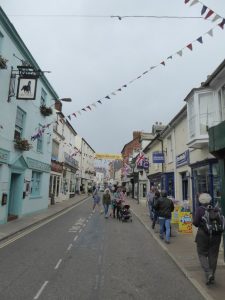… as destination points.
“We need planners and local authorities to recognise the importance of the hospitality and nightlife sector on the regeneration of our town and city centres post-Covid.”
Could community food halls provide alternative anchors?
.
Exeter is now without several big shops on its high street – but perhaps there’s a future for these spaces, as reported in the Independent earlier this month:
The move to online is inevitable, however as these stores close, we need to look ahead at what will replace them. This groundwork needs to start now to repurpose empty retail stores or we risk the end of the high street as we know it.
Letting high streets become saturated with boarded up premises will spark a domino effect of closures for sectors who rely on the passing trade, creating long-term socio and economic hardship for local areas. These urban areas are crucial to the very survival of towns and cities, and we need these areas to entice tourism.
We need planners and local authorities to recognise the importance of the hospitality and nightlife sector on the regeneration of our town and city centres post-Covid. My feeling is we can either sit back and reminisce about our once bustling high streets, or we can work together to repurpose them as destination points for our towns and cities.
.
One company sees real business opportunities – which can also benefit local communities:
P-THREE, a real estate consultancy specialising in retail, restaurants and leisure, has today unveiled its Foodhalls Report – F-Hubs Insights 2021. The sector saw a boom in 2017 with more than 20 foodhalls opening in London alone and it is expected to gain significant traction over the coming years as the sector evolves into two new formats – community and flagship…
F-Hubs will still be centred on food, but they will also critically have the flexibility to respond to local demand for other uses such as the arts, cinema, retail, cultural, flex workspace or educational spaces. To reflect this the new generation of spaces are called F-Hubs where the ‘F’ stands for both food and flexible use.
Thomas Rose, co-founder of P-THREE, said: “Community F-Hubs have the potential to lead the regeneration of high streets and town centres. Located in the heart of local communities they will be an intrinsic part of the high street or urban quarter offering a truly mixed-use space combining anything from live events to daily co-working to ensure they draw a sustainable audience.
“The regular footfall and spend generated will act as a catalyst for local regeneration as well as adding value to neighbouring properties making the proposition particularly attractive to both private and public sector landowners and investors.”
- Successful community F-hubs are likely to be in spaces which are:
- hyper local – at the core of a High Street or urban area.
- hyper relevant – linking people and giving them a reason to visit.
- hyper convenient – easily accessible to a diverse local audience.
- hyper connected – part of, and supported by, their local community.
- Hyper flexible – anchored by food but offering flexible event, community, retail and work spaces.
Community F-Hubs will need to respond to their local catchment, meaning deep local knowledge will be key to determining what other uses will work most effectively alongside an F-hub in any given location. With a focus on supporting local business it is expected that independent producers and off-line, real life leisure underscores an inherent and sustainable demand for community F-hubs.
.
As reported in today’s Guardian:
Food halls were springing up in town and city centres before the pandemic but now smaller community versions, with an extra dimension such as a cinema screen or co-working space, could be arriving on a high street near you.
There is potential for up to 120 of these community food halls across the UK, a new report has found, as big shifts in consumer spending and attitudes caused by the coronavirus pandemic – including a newfound appreciation of local community – prompt investors to consider piling in…
Urban regeneration has historically been retail-led, but with high streets battered by a crisis that has led to household names such as Topshop and Debenhams collapsing and online sales rocketing, no one thinks more shopping is the answer any more.
“The danger in real estate is that people are too often just trying to fill space,” said Rose, who says community food halls could provide alternative anchors. “We advise people to put the right tenants in the right buildings, to make sure it is sustainable.
New breed of local food halls in UK towns offer grub and a hub | Commercial property | The Guardian
.

Could this kind of thing happen in Sidmouth?
Who will be filling the empty shops along Sidmouth’s High Street? – Vision Group for Sidmouth
A new delicatessen has opened – and during the current pandemic:
New food shop opens in Sidmouth – Vision Group for Sidmouth
A waste-free shop opened just over a year ago:
Fillfull: plastic-free shopping in Sidmouth – Vision Group for Sidmouth
There are new ways of delivering food:
In My Back Yard: new East Devon food network expands – Vision Group for Sidmouth
And there are clever ways to make use of the internet:
A virtual high street for Sidmouth? – Vision Group for Sidmouth
Fundamentally, though, there is something special about Sidmouth which should make people want to go down for a wander:
The high street and Eastern Town: a sense of place – Vision Group for Sidmouth
Ultimately, we need to ‘go beyond retail’:
Reviving the high street: getting the mix right – Vision Group for Sidmouth
And see the high street as a destination with more to offer: